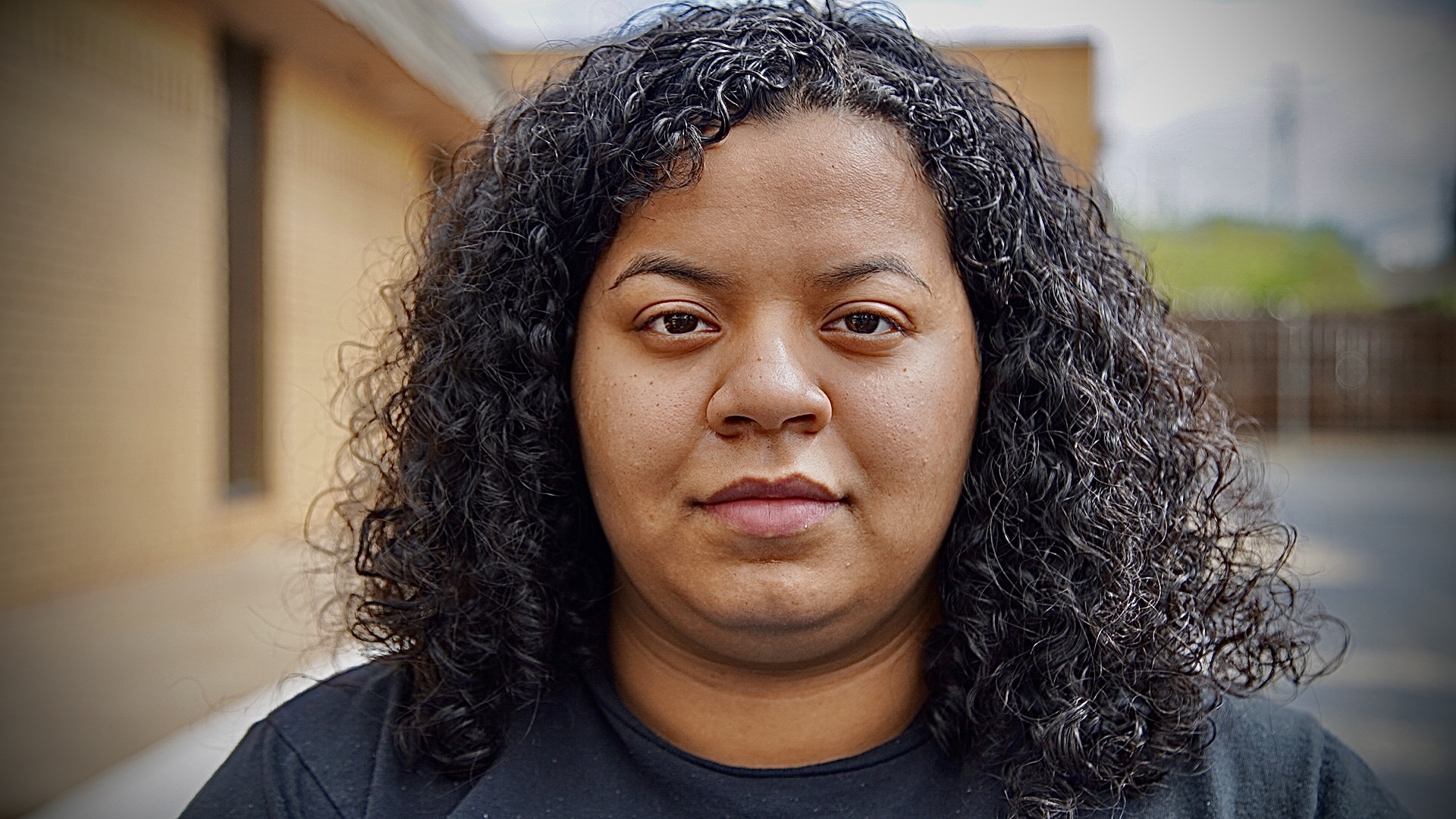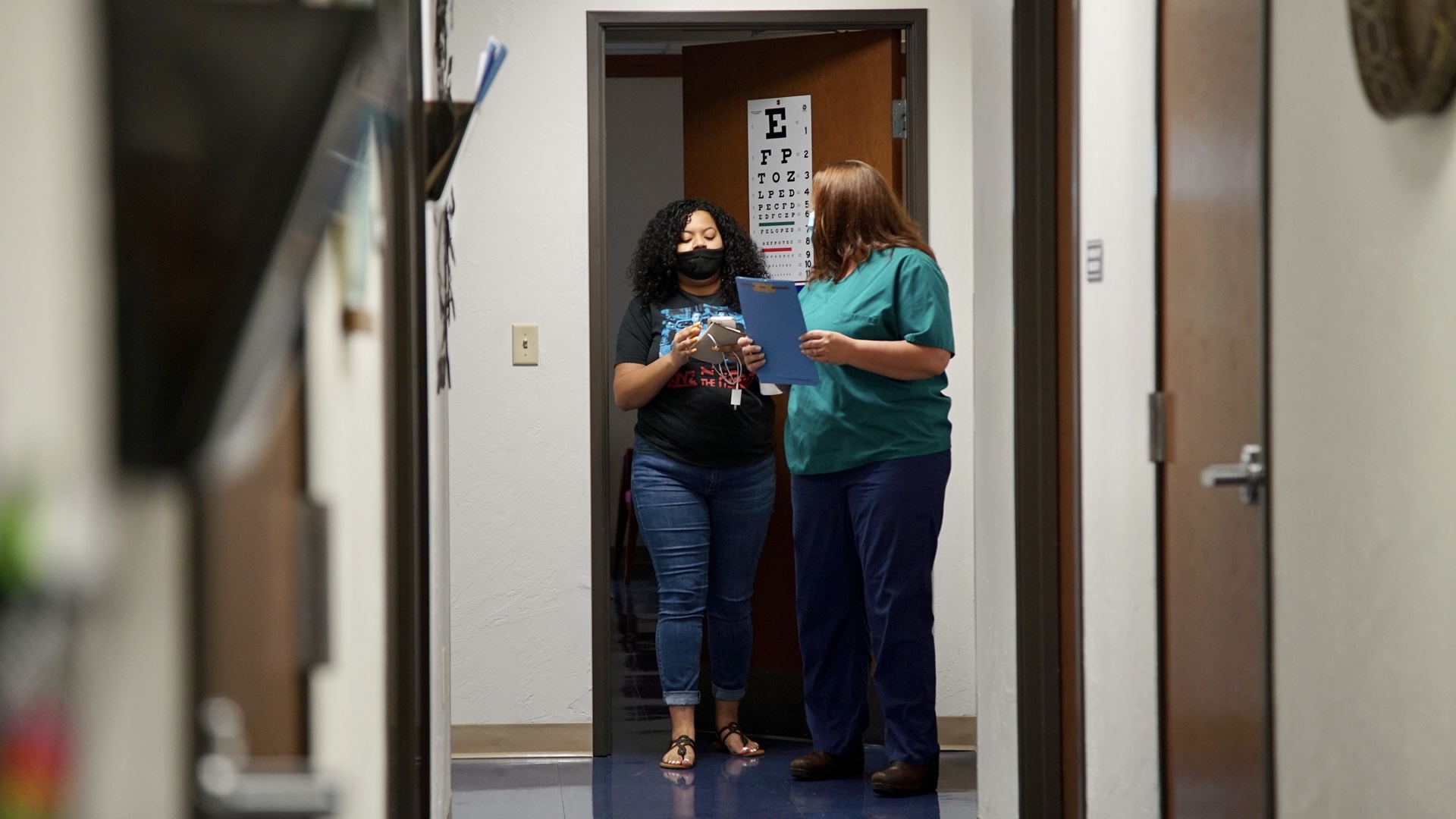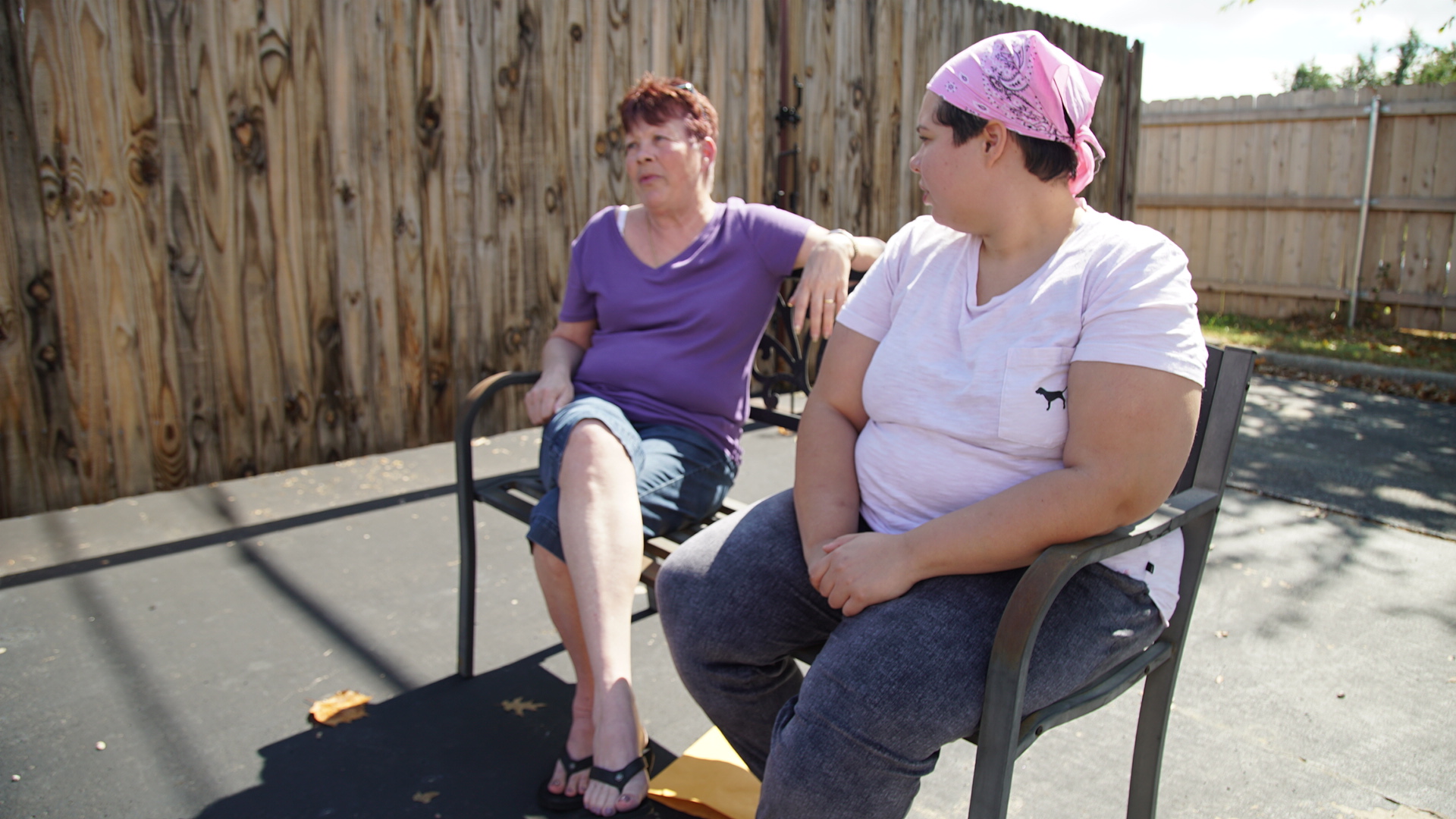Here's What It’s Like to Flee Texas and Drive 200 Miles for An Abortion
Want the best of VICE News straight to your inbox? Sign up here.
FORT WORTH, Texas — It took Jasmine and her boyfriend, Alex, 20 minutes to drive back to their apartment from the local abortion clinic. It should have been a short, easy drive.
But Jasmine was six weeks and one day into her pregnancy, and providers at the clinic could detect “cardiac activity” on an ultrasound. That meant that, under a new Texas law, Jasmine could not get an abortion anywhere in the state. She spent the drive home from the clinic overwhelmed with worry, trying to make sense of her possible futures.
There were really two options: have a baby, or go out of state for an abortion.
“I'm not even in my thirties yet. I'm not ready for that,” said Jasmine, who is 26. “I'm not ready to bring another life into this world that I can't support.”
She didn’t even know, that first day, if she could afford to leave Texas. The preparations required weeks of scraping together money and hammering out scheduling. But Jasmine managed to secure an appointment at the Trust Women abortion clinic in Oklahoma City—some 200 miles away.
“I shouldn't have to go and plan this elaborate trip, spend double the money for my own health. It's not fair,” Jasmine told me the evening before her appointment, as we sat on the stoop outside her sparsely furnished two-bedroom apartment. “It's more angered me, than anything else, because I feel like my voice needs to be heard. Other women's voices need to be heard. And we’re getting shot down. There is no sense of security for women in Texas at this point.”
I first met Jasmine at that Fort Worth abortion clinic. From the moment Jasmine found out that she couldn’t get an abortion in Texas, she was determined to document what was happening to her. So, she invited me to come with her to Oklahoma.
The appointment was set for Saturday, Oct. 2, the day that people marched in the streets in support of abortion rights—and one day after Jasmine had to pay about $1,450 in rent. It was the latest expense in an ever-expanding list.
There was the gas Jasmine would need to drive to Oklahoma City ($50). There was the oil change she needed ahead of the drive ($60), and the new tires ($150). There was the hotel for the night before the abortion (another $150). Jasmine’s mother had agreed to watch Jasmine’s two kids; her mom is disabled and Jasmine's kids "are a handful,” so she paid her mom for the child care, too. That cost $70. Food and toiletries added up to yet another $150. And, of course, there was the abortion itself: A medication abortion, which is induced by pills, would cost her at least $650.
“I'm not ready to bring another life into this world that I can't support.”
Jasmine took out a loan of $1,350 to pay for it all. With interest, she believes that it’ll balloon to around $1,500 by the time she’s paid it back. Had she been able to get an abortion that day, in Texas, the whole thing would’ve likely cost Jasmine $650.
“I actually am currently in debt already, so this just adds fuel to the fire,” Jasmine said. Her curly black hair piled in a bun on top of her head, Jasmine wore a Michael Jackson t-shirt and plaid slippers. One slipper read, “Mama.” The other: “Bear.”
Since Sept. 1, when Texas enacted a law, SB8, that bans abortion as early as six weeks into pregnancy, people like Jasmine have sought the procedure beyond the Lone Star State’s borders. Last week, Planned Parenthood of the Rocky Mountains, which runs clinics across Colorado, New Mexico, and Nevada, announced that it had seen 106 Texan patients in September—a 130 percent spike. The group that runs the Oklahoma City clinic where Jasmine got her abortion, Trust Women, also has a location in Wichita, Kansas. That clinic saw just one Texan patient in August 2021; by the end of September, it had seen 51.
The Trust Women Oklahoma City dealt with an even bigger surge in people coming from Texas for abortions. In August, it saw 11 Texans. In September, the clinic saw 127.
What’s happening in Texas is not staying in Texas. The impact of the state’s ban is radiating outwards, across the nation, and redrawing the U.S. map of abortion access.
The night before Jasmine’s abortion appointment, it wasn’t the thought of her bank account that tore at her the most. Instead, it was the lie that she told her deeply Catholic mother. Jasmine had told her that she needed child care because she was getting uterine surgery.

“I've been afraid that—what if my mom finds out what I'm doing and then she disowns me?” Jasmine said, her voice shaking. She unspooled her worst-case scenario: “She doesn't speak to me anymore. Then my kids lose a grandma. And I can't—I mean, I can't live without my mom and my kids can't live without my mom.”
When she dropped her kids off at her mother’s, at least one of her children started to cry. Jasmine and Alex, kept it together in front of the kids, comforting them with a special handshake they do every night before bed. But after they walked out of her mom’s house, Jasmine broke down too.
“I just feel terrible. I know she’s been praying for me,” she told Alex of her mom. “I just can’t wait for this to be over.”
For people who’ve never spent time in Texas, it can be easy to forget that it’s big enough to be one of the largest countries in the world. One in 10 U.S. women of reproductive age live in the state, according to the Guttmacher Institute, which tracks abortion restrictions.
Before the Texas ban took effect, those women had to drive an average of 17 miles each way to the nearest abortion clinic, per Guttmacher. After its implementation, that distance increased to 247 miles.
Abortion patients all over the South and Midwest may soon be forced to travel just as far. Next summer, the Supreme Court is expected to rule on a case that threatens to overturn Roe v. Wade, the 1973 decision that legalized abortion nationwide. With a 6-3 conservative majority on the Court, the odds of Roe’s survival are not particularly high.
If Roe goes, fewer than half of U.S. states would have protections for abortion rights, according to the Center for Reproductive Rights.
Jasmine’s abortion appointment was at 9 a.m., so she and her Alex decided to make the three-hour-plus drive to Oklahoma City the night before. The pair have now been dating for about a year, long enough for Jasmine’s kids to start calling Alex “daddy,” even though he’s not.
In the darkness, everything that could have been vaguely interesting was gone. The river that separates Oklahoma from Texas had gone missing. The stars were lost in the haze of light pollution. The drive was a boring, exhausting trek through a thicket of highways, strip malls, and the odd neon sign.
If Roe goes, fewer than half of U.S. states would have protections for abortion rights, according to the Center for Reproductive Rights.
Jasmine had never driven out of state before, and doing so at night made her anxious and irritable. The sheer injustice of having to do this at all pricked at her. She did everything right, she told me. She was on birth control. She’d taken Plan B. She had a normal period. The only reason she took a pregnancy test, Jasmine said, was because she had one lying around and, as a woman who’d been pregnant before, she felt a familiar shifting deep in her body.
“Alex, imagine if I didn’t take that test. I would have never fucking known,” Jasmine said as they drove.
“You would have never known. You would’ve missed your period this month,” Alex, 24, agreed. That kind of delay could have made the trip even more expensive. The cost of a surgical abortion, which is necessary past a certain point in pregnancy, starts at $700 at the Oklahoma clinic. The further into pregnancy the patient is, the more expensive an abortion can get.
“That’s what pisses me off,” Jasmine continued. “I should be able to make that decision, not y'all. Y'all aren't the ones carrying the fucking thing. Y'all aren't the ones that are having to deal with my life and deal with what I got going on. I did what I needed to do.”
As the car drove on, the tension eased. Jasmine kept singing along to the stereo, to rap songs, to Ella Mai and Kehlani, to a song by a Tejano singer about a man who wants to die for love. “This song is so not true, but it’s so sweet,” Jasmine told Alex, before translating it for him. “Este hombre se murió de amor. He’s saying, ‘This guy died of love. Please, let me go with you. Please take me with you.’”
“I should be able to make that decision, not y'all. Y'all aren't the ones carrying the fucking thing. Y'all aren't the ones that are having to deal with my life and deal with what I got going on. I did what I needed to do.”
But the purpose of the trip—and Jasmine’s fury over having to make it—never really faded. When Jasmine stopped to go to the bathroom, just past the border into Oklahoma, she brashly told a stranger what she was up to: “I'm getting an abortion and it's illegal in Texas, so we came out here.” (“Oh, okay,” they said. “Good luck with all that.”) Later on, Jasmine suddenly sighed, “Where am I at? I don't like it here. Take me back to Texas. Oh, I forgot. I can't.”
Finally, at around 1 a.m. on Saturday morning, Jasmine’s car pulled into the parking lot of an Oklahoma City hotel. Alex and Jasmine were exhausted. Talk had dwindled. The once-bumping stereo was a low hum.
The couple disappeared into the hotel’s bright lobby. They had, at most, seven hours before they had to wake up.
No one really believed that Jasmine’s abortion would happen at 9 a.m. Instead, Jasmine was prepared to wait for as long as eight hours.
She couldn’t walk in, take a pill, and walk out. Oklahoma has its own slate of abortion restrictions, including a requirement that all abortion patients must undergo counseling at least 72 hours ahead of undergoing the procedure. By state law, the counseling includes the warning, “Abortion shall terminate the life of a whole, separate, unique, living human being.”
Jasmine underwent that counseling before she even left Texas. But at the clinic, Jasmine still needed to sit through another ultrasound, per state law.
The Trust Women clinic was also swamped with patients. By 9 a.m., when I walked through the clinic doors, a handful of women were already seated in the waiting room’s selection of cozy armchairs. Everyone seemed to be young. No one spoke to one another.
Abortion clinics across the country are likely now seeing a similar scene play out in their own waiting rooms. On Wednesday, days after Jasmine’s journey out of state, U.S. District Judge Robert Pitman temporarily froze Texas’ abortion ban.
“I see a lot of women of color in here.”
“The inundation of Texas patients overburdens abortion services in other states, many of which are already stretched to the breaking,” Pitman wrote in a 113-page ruling. “Underscoring the national scope of the harm, Kansas clinics are now struggling to cope with an influx of patients from Louisiana who, prior to the passage of SB 8 would have traveled to Texas for abortions, but now must find another, more hospitable state among the ever-dwindling number.”
Pitman’s freeze didn’t last very long. Within two hours of his ruling, Texas moved to appeal it, and, by late Friday, the 5th U.S. Circuit Court of Appeals had once again instituted the abortion ban.
When she walked into the waiting room, Jasmine told me that her first thought was, “I see a lot of women of color in here.” This was not unexpected: In a lawsuit filed over the summer, in an effort to halt the Texas ban, abortion providers alleged, “The burdens of this cruel law will fall most heavily on Black, Latinx, and indigenous patients who, because of systemic racism, already encounter substantial barriers to obtaining health care, and will face particular challenges and injuries if forced to attempt to seek care out of state or else carry an unwanted pregnancy to term.”

It’s clear that the clinic is at least trying to sooth its patients. Its aesthetic could best be described as “Pinterest mom.” The rooms are littered with signs like, “Bloom Where You Are Planted,” “You’ve Got This,” and, of course, “Well-Behaved Women Seldom Make History.” The clinic soundtrack relies on entry-level pop, such as Taylor Swift and Pink’s greatest hits. There is at least one overtly political sign, which reads, “My Body My Choice,” although that’s not exactly a radical statement to make in an abortion clinic.
Out of the 18 patients who got abortions that Saturday, just two were from Oklahoma. The rest were from Texas.
“Secretly, I think they're trying to shame us. They're trying to shame all women.”
Samantha, a 24-year-old in a pale pink bandana, was one of them. Like Jasmine, she’d driven in from the Dallas area the night before—but she’d brought along her mom, Pamela, who has undergone three abortions of her own. As the pair spoke about Texas, Pamela was by turns angry and teary, while Samantha grew more indignant.
“Secretly, I think they're trying to shame us. They're trying to shame all women,” Samantha said of Texas.
“I don't think they’re trying to shame women. It's my opinion,” disagreed Pamela, who wore a cross around her neck. “I think they just want to put us back 200 years, where we have no rights.”
The man with whom Samantha got pregnant had agreed to help pay for the trip to Oklahoma, which would likely end up costing about $1,000, according to Samantha’s estimates. If he hadn’t stepped up, Pamela would have offered to pay for it.
“I'd do anything for her. If it meant we had to go to Albuquerque. I would have done it. If it meant going to Wichita or Illinois, I would have done it,” Pamela said. “Because it’s her choice. And it's just tough that we had to leave our state for all of this, because it's just ridiculous and it hurts.”
Technically, the Texas ban outlaws abortion once “cardiac activity” is detected, a phenomenon can emerge as early as six weeks into pregnancy—but is still a misnomer, because at that point, the embryo does not have a fully developed heart. Several conservative states have attempted to implement similar bans, but the Texas ban has survived in court so far because the state government, in an extraordinary move, has outsourced its enforcement to ordinary people. Individuals can sue anyone who “aids or abets” an illegal abortion. If they win, they can be awarded damages of $10,000. (If an abortion provider wins in such a lawsuit, however, they can’t even collect attorney’s fees.)
Attorneys for the abortion providers who’ve sued to stop the law have said that it isn’t against the law to help someone drive out of state for an illegal abortion. But because the law is meant to be enforced by random people, rather than the government, there’s no guarantee that someone won’t try to sue Pamela for helping Samantha.

Pamela was totally unfazed by that idea. The Texas judicial system, she said, would never stand for that kind of lawsuit.
“Yeah, I have the money,” Pamela said. “They can get blood out of a frickin’ turnip far as I'm concerned.”
Around noon, Dr. Maya Bass, who was performing abortions at Trust Women that Saturday, walked Jasmine through how it all worked. After Jasmine took one pill at the clinic, she would need to follow it up with subsequent pills, each of which she would tuck into her cheeks. She could take ibuprofen for cramping. She should have some bleeding, but not too much. Her pregnancy symptoms should vanish within two weeks.
Bass, a cheery family medicine doctor, had traveled farther than both Jasmine and Samantha to get to the clinic that Saturday. For the last three years, Bass has flown into Oklahoma about once a month to provide abortions. That’s not an uncommon arrangement among abortion providers; clinics can struggle to find local doctors who are willing to not only do abortions but to also put up with the potential harassment and danger that comes along with them.
“On the days that you feel really tired, because you're seeing people have to deal with things that are so unnecessary, that are completely medically unnecessary, it can get really hard.”
“I just have to keep reminding myself that that is enough. Being here and doing what I'm doing is enough. And yet they're being forced to go through all of this just to get the care that they want and they need,” Bass told me. “So on the days that you feel really tired, because you're seeing people have to deal with things that are so unnecessary, that are completely medically unnecessary, it can get really hard.”
Bass punctuated her speech to Jasmine with a staccato, “OK? OK.” Jasmine, calm and determined, quickly took up an answering rhythm: “OK. OK.” As the speech went on, they started to say it at the same time.
Bass pulled out a small, white box.
“This is the pill that ends the pregnancy, OK?” Bass told Jasmine. (“OK.”) “So most people don't have any symptoms with this pill, OK?” (“OK.”) “Occasionally, some spotting.” (“OK.”) “That means if you have to get anything done, you should do it today and tomorrow morning before you put the pills in your cheeks, OK?” (“OK.”) “Before I give you this pill, do you have any other questions for me?”
“No,” Jasmine said. “It sounds pretty simple.”
Jasmine held out her hand and Bass dropped the single white pill into it. Jasmine pinched her black mask back with her long, daffodil-colored fingernails, swallowed the pill, and took two gulps from a small cup of water.
Jasmine’s abortion—the pill that she had traveled more than three hours for, that she had sacrificed upwards of $1,000 to get to—lasted only a few seconds.

When we spoke, just a few minutes later, Jasmine’s whole body already seemed lighter. She didn’t smile, exactly. She was tired and she still had to drive back to Texas. But her voice was no longer hemmed by anxiety. She talked about going back to school. Maybe she’d work at an abortion clinic one day.
“I feel confident. I feel empowered. I feel like I made the right decision. And this is like the first time I can say I've actually felt that way through this entire process,” Jasmine said.
It would take, she admitted, between six months and a year to financially recover from the expenses of getting an abortion in Oklahoma.
“That part is ridiculous. I could have cut the cost in half, had I been able to do this in Texas,” Jasmine said. “But the outcome of this is worth it. It's definitely worth it all.”
#DmtDailyNews
via https://www.DMT.NEWS
Carter Sherman, Khareem Sudlow

